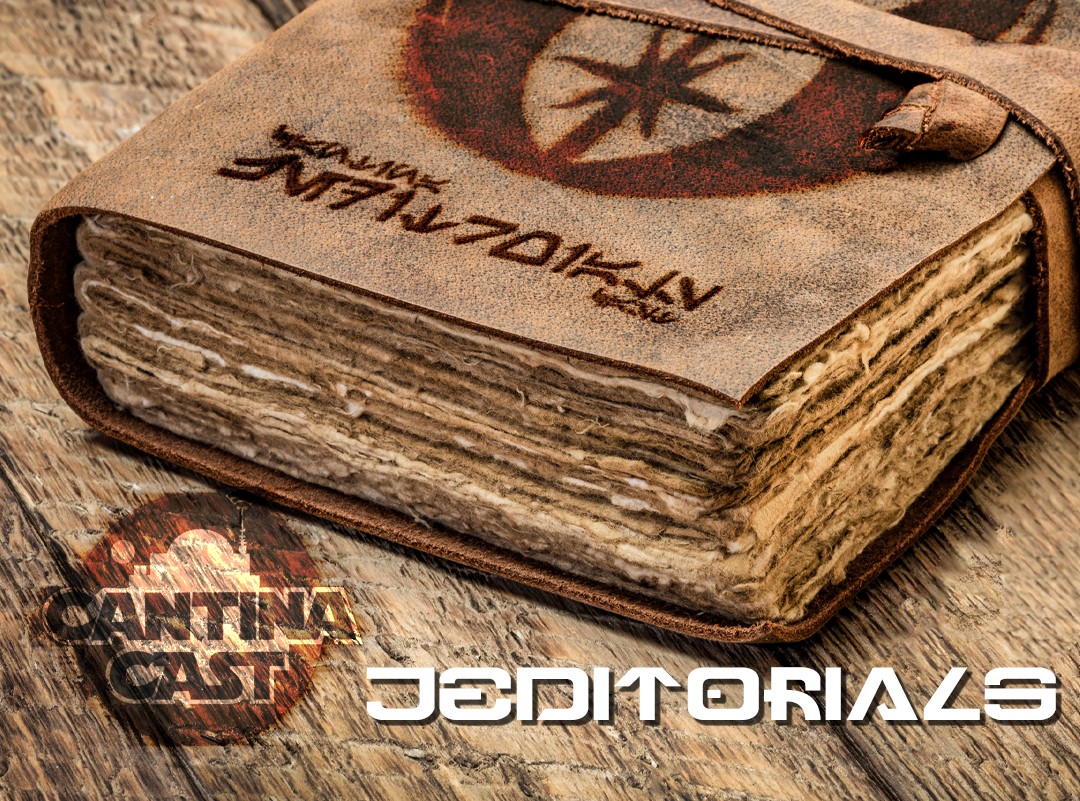*Disclaimer – Upon rereading this, it comes off like I’m taking this too seriously. It’s all in fun.
The life of a Star Wars fan is tough. It’s not as easy as some people seem to think. When I was 10 years old, I was enthralled, I was just taking it all in and all I thought about was the fun and the music. Now I’m 42 and all I think about is themes.
Ok, I’m done with my riff of the opening dialogue from My Dinner with Andre. When we were young, we just had fun with Star Wars. We still have fun with it now but also enjoy analyzing the themes, music, and characters of this wonderful space saga. Essentially, we can be a contradictory mix of Wally and Andre. We love the steady and predictable nature of Star Wars, but at the same time want it to be creative, dramatic, and surprising. Mark Hamill just earlier this year said, “Essentially it was a fairy tale for young children, and it enabled George to tell a story that was very clear cut, where the villains were the villains. The heroes were the heroes”. But, by Tony Gilroy’s own words, “With Andor, we’re setting a new vocabulary for Star Wars”. The “new vocabulary” is throughout many different aspects of the show. I don’t mean to say that the traditional Star Wars elements are absent from Andor. The series is laced with them. However, there are some noticeable differences. I’m not going to get into the more superficial of it like swears, socks and stuff. I’m more looking at comparing a couple lessons from Andor.
NEMIK’S MANIFESTO
There is so much in Nemik’s manifesto that rings true to life and to Star Wars, but there was just one little thing that stood out to me. The final line of Nemik’s manifesto is “Remember this … try”. Star Wars has said a few things about trying. In Star Wars Rebels, Kanan gave us the best summary. He said, “If all I do is try, that means I don’t truly believe that I can succeed.” Nemik’s manifesto doesn’t care about individual successes. A small, half-hearted rebellion still pushes those lines forward. Now Nemik isn’t encouraging tepid rebellions. What he is essentially saying is “You will probably die from this, but eventually someone won’t. Let’s do this!” That would motivate Maarva, but maybe not many others on Ferrix. Meanwhile, Maarva’s more motivating, and less academic, funeral rant started a riot. I am not going to avoid the obvious counter to this. Nemik isn’t wrong in his thesis. The opening crawl of A New Hope says that the Rebels just won their first victory. But, when I hear Nemik’s manifesto, it doesn’t push the “hope” buttons of my psyche that Star Wars likes to push.
LUTHEN’S THESIS
Luthen is an anti-hero. Star Wars has plenty of these, but this story is the only one that agrees with the anti-heroic sentiment. Luthen’s “thesis” is that the only way to bring the Empire down is to use the same evil methods the Empire uses. “The ends justify the means” so to speak. Star Wars has always pushed against this. Saw Gerrera in Rebels is villainous, Luke throws away the lightsaber in Return of the Jedi and Anakin (and the galaxy) falls to darkness because he chose to use the tools of his enemy to save Padme. This show doesn’t portray Luthen as an admirable figure, but it does tell us that he is begrudgingly correct.
Luthen’s heist on Aldhani successfully accomplished two things. It inspired some to have an increased desire to rebel and it gave the empire an excuse to exert further control over its citizenry which in turn would motivate even more to rebel. The story of the Aldhani heist activated Maarva’s desire to rebel and got Andor caught up in the Empire’s cruel crackdown. Maarva went on to start a mini rebellion on Ferrix and Andor joined Luthen on his quest. The show creates a direct link between Luthen’s “the ends justify the means” ideology and our desired outcomes. I am not arguing that there can’t be truth to it in our real world, but it is never something that Star Wars has encouraged and conversely has actively discouraged.
Luthen’s monologue on the skyway is unambiguous in showing how much Luthen loathes himself for what he is doing. There is a contrast to Luthen in Kleya. Unlike Luthen, she seems happy to “use the tools” of her enemy. This could be a way for the show to have us sympathize with Luthen. He at least doesn’t want to kill Andor or send poor Kreegyr and his crew to their death just to protect his nascent rebellion. My question is, should we agree with what Luthen is doing? The show has given a reluctant yes while Star Wars has always given an encouraging no and provided a better path. To quote Ender Wiggin in the fairly maligned Ender’s Game movie, after he is tricked into committing horrible acts to win, his response is an unequivocal declaration, “the way we win matters.”
CAVEAT
Having said all that, I want to make it clear that while I don’t like it and I don’t agree with it, I do accept it. There is a poignant (and long) quote from My Dinner with Andre that warns against being too complacent in staying within what you feel is comfortable. We all have our own opinions about what Star Wars is and what it should be. That is of course fine as long as we recognize that other people feel differently. I don’t think I’ll ever be ok with a clear indication of socks (sp) in Star Wars. Not because it is bad, but because I like that Star Wars has always been produced with the child audience in mind. I’m not wrong for feeling this way and you aren’t wrong for disagreeing.

Dante DeMille
Dante enjoys both the casual and encyclopedic nature of Star Wars. Along with taking Star Wars too seriously, he enjoys playing board games, Lego and lightsabers with his family.
You can find Dante on the Cantina Cast Discord server as UtinniUtinni!




No responses yet